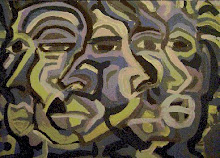
When we were kids and had no money to spend - we would sit on the curb, cooling our feet in the puddles of water that would collect in the gutters. After a long day of playing, we would daydream about what we would do with a million dollars. We had no idea of how much a million actually was, but we knew that it was a lot. I would always dream of making a lot of money and helping those who had little or none. But most days we were more concerned with having enough money to buy a Bomb-Pop from the ice cream man. We would sit and wish that someone would drive up and give us kids enough money to buy all the candy, bubble gum and ice cream we wanted.
How Do We Give? When I was older, I returned to the street where I had made all those wishes. My play-cousin Ray-Ray and I thought that it would be nice to drive down to our old block and give money to the children to buy whatever they liked from the ice cream truck. "Hey kid, Do you want some money?", I would yell. (Maybe that wasn't the smartest thing to do.) The kids took-off running down the block,-yelling, "MaMaaa...!". Initially, we drove off quickly - trying to figure out why these kids didn't want money. Then it hit us, times had changed. Maybe our old dreams were no longer possible. We drove back to our old neighborhood and waited for the police and the children's parents to confront us. After we explained and laughed at the situation, we drove away wondering about the real needs of the children in our old neighborhood. How do we give? I still have no idea.
Solving the problem of poverty is one of those questions with many answers. There is no single answer. There is no "Universal Solution". I've heard excuse after excuse but little in terms of a sustainable answer.
Many would say that education is the key. By 1940, the literacy rate for Blacks was 80%. Keep in mind that this was before the Civil Rights Movement and Brown v. . According to the National Adult Literacy Survey, the literacy rate among Blacks today is only 60%. In other words, the Illiteracy rate for Blacks has doubled (from 20% to 40%) in the last seventy years. Literacy is important. According to the Justice Department, 80% of incarcerated violent criminals are illiterate (or close to it). Who is responsible for making sure their children can read?
Many would cite racism. Let's take a look at race. The five "Blackest" cities and their percentage of the population, the murder rate and the overall crime rate; Gary, Ind. - 84% Black, Murder rate 8.75 times the national average, overall violent crime rate 1.31 times the national average, Detroit, Mich 81.6, 5.16, 3.38, Birmingham, Ala. 73.6, 4.63, 2.33, Jackson, Miss 70.6, 3.24, 1.52, New Orleans, LA 67.3, 7.54, 1.62 . The "Whitest" cities; Livonia, Mich 96.5, 0.00, 0.31, Cape Coral, Fla 93.0, 0.11, 0.45, Boise City, Idaho 92.2, 0.20, 0.55, Independence, Mo, 91.9, 0.23, 1.11 Scottsdale, Ariz, 92.2, 0.4, 0.37. Remember; the literacy rate for Blacks was higher before the civil rights movement. Literacy is a greater measure of incarceration than is race, economic background, parental situation or any other factor. (Do I really need to type all of the graduation rates for these cities?) The above listed cities and their dominant races and cultures reflect vastly different results. How can those cities that are seventy (or more) percent Black still cling to the idea of racism being to blame for poverty in their cities?
Still others cite genetics/eugenics. Many would say that maybe Blacks are just more stupid. Let's look at the percentage of Black African immigrants and their rate of having a bachelors degree or higher. Egypt 59.7, Cameroon 58.7, Nigeria 58.6, South Africa 55.8, Kenya 51.4. According to the Census Bureau, only twenty-seven percent of the overall population of the United States has a bachelors degree or higher. How can these (the Blackest Blacks) overcome genetics under the same circumstances? These Black Africans in the U.S. earn 50% more ($45,000 to $32,500) annually than their African-American counterparts.
The effects of entitlements. (A tale of two families) Both of my paternal grandparents grew up on farms. Both were raised in families with more than thirteen children (grandmother-13, grandfather-17) Both families received royalties from oil companies to lease their drilling rights. My grandmother's family also received payments to NOT grow crops (a practice used to supposedly stabilize the price of food and crops). After a couple of generations, most of my grandmother's family is dirt poor and unqualified to work - while my grandfather's family produces doctors, lawyers, professors, engineers, nurses and teachers. Even those raised in single parent homes learned to work for what they wanted, most are now professionals. Those who received money with no preparation failed - those who had a little help seemed to develop the skills required to thrive. Both families passed their values on to their respective children with almost totally corresponding results.
I don't hate the poor. Someone asked me how I could consider myself to be the third poorest person in Beaumont, Texas and still own so much property. It's easy, by doing too much for too many for too long with too little. (The same thing happens in states and municipalities with too many people relying on the system) I'm not just writing about the poor. I am poor. I'm writing from first person experience. My property was in a trust so I couldn't use it as collateral or sell any. I used what little I had in my 401k and savings to upgrade my rentals so that my tenants could have a descent place to live. I've done work for people valued at tens of thousands of dollars at no cost to the person (in addition to my volunteer work at Habitat) in an effort to try to help others get ahead. I've done without even basic utilities so that my tenants' children could have diapers, food and formula. As I'm typing this, I'm babysitting (at no cost to the family) an elderly blind woman so that her family can work and get ahead. So no, I don't hate the poor. I've become poor by trying to help the poor.














4 comments:
"I've become poor by trying to help the poor."
What is rich? What is poor?
What is wealth? What is poverty?
You are wealthy in spirit.
You are wealthy in kindness.
You are wealthy in thought.
You are wealthy in intelligence.
You are wealthy in family.
So long as you have the strength to work and the mind to think, you will never be poor.
Man, you do too much. You are the kind of person I hope to meet when I get the school up and running. I might not want to be on the ground level but I want to give that person the backing and the planning I know I learned through business.
Sometimes being rich in spirit great if you want that. I don't know why we can't be both at the same time.
i'm gonna make my own site about it
по моему мнению: прелестно.. а82ч
Post a Comment